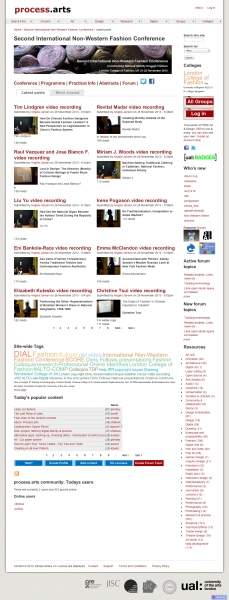Conferences on process.arts
As process.arts has evolved we have found it to be a very useful, ready made online environment for conference groups to quickly set up and share and promote conference content. The first conference pilot was Fashion Colloquia and then Drawing Out Conference 2012 which successfully encouraged users to add their content to the site. We recently had our third conference group on process.arts The Second International Non-Western Fashion Conference this gave us a great opportunity to learn from the previous experiences and try out some new approaches, such as links below the main home page banner to important content, social media integration, using metadata to cluster and surface content better and trying out a forums etc. Please see some case study feedback from the latest conference organiser Angela Jansen below:
 Below is a edited Section of the Evaluation Report:
Below is a edited Section of the Evaluation Report:
2nd Non-Western Fashion Conference, London College of Fashion, 21-22 November 2013
Background
On the 21-22 of November 2013, London College of Fashion hosted the second edition of the Non-Western Fashion Conference. In today’s globalizing world, this two-day event questioned dichotomies like ‘traditional’ versus ‘fashionable,’ ‘tradition’ versus ‘modernity’ and ‘non-Western’ versus ‘Western.’ A new generation of fashion scholars is acknowledging the existence of different (non Euro-American) fashion systems and realizing that there is a growing urgency for fashion theory to rectify its ethno- and Eurocentric approach.
The conference was not only interdisciplinary but also cross-regional, assembling researchers who are engaged in creative and critical rethinking of (non-Western) fashion systems in a wide scope of geographical areas. This second edition focused on the construction of national fashion identities and how fashion designers are increasingly branding their national heritage/tradition as a successful marketing tool, while simultaneously reinventing/modernizing it.
...... besides a standard events page (which was very hard to find due to the transition to a new website at UAL), it was not possible to create a webpage for the conference. It was only after several failing attempts (not knowing who is responsible for this) and considerable time loss, that process.arts by CLTAD offered a solution. Therefore, communication wise, improvements could be made. For this edition, the main communication was organised through ConferenceAlerts.com, H-Net, Academia.edu, ResearchGate, personal mailing lists, a Facebook page, a Twitter account and a process.arts page.
Process.arts
It was only on the 18th of October (= one month before the conference) that I was put in touch with Chris Follows, who runs the process.arts project at CLTAD. He was, however, very efficient and proactive in setting up a conference page, giving a crash course in how to manage it and providing support during the entire duration of the project. Very soon it became clear what the advantages are over a ‘regular’ web page because it taps into an already existing network. Besides general information on the conference (programme, abstracts, booking info, general info on the venues, etc.) it enables to create individual profiles for all conference delegates with their bio’s, contact details, abstracts, full papers, PP presentations, video recordings, etc., which become searchable through tags. In only a number of days, profiles had reached a hundred visits (today some profiles have been visited almost 400 times and the conference details have been visited over 700 times). Visitors and delegates are able create their own accounts and contribute content. Although it is pretty time consuming to manage, it is not only a great tool for communication but also a means to create an online platform to continue the discussions initialised during the conference through the forum and to keep momentum. In addition to Facebook and Twitter, it enables to reach a broad audience. Because this event was a pilot, we identified throughout the process some new additional functionalities, like ‘joining a session group, with lists of group members, etc.’ which Chris hopes will help inform the future process-arts upgrade. The main challenges were getting people to authorize to have their papers and presentations put online (people are not familiar enough yet with open-access), working with social media to its full potential and dealing with videos (formatting and compressing them).

This Work, Conferences on process.arts, by cfollows is licensed under a Creative Commons Attribution-ShareAlike 4.0 International license.

